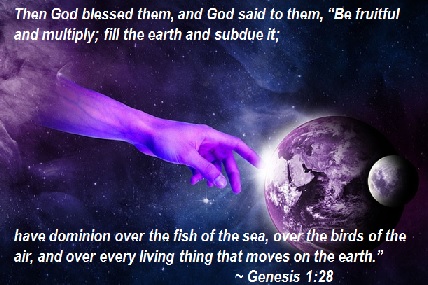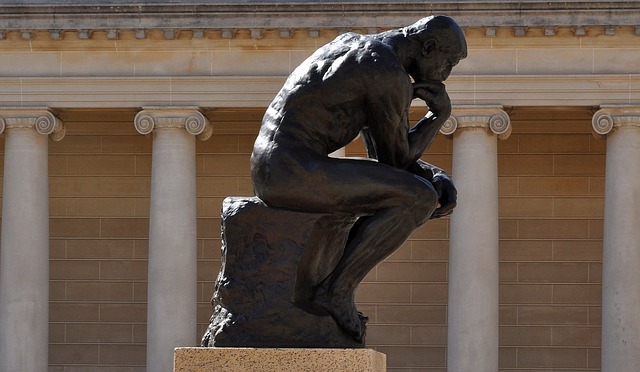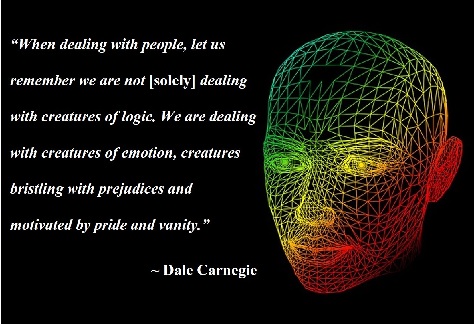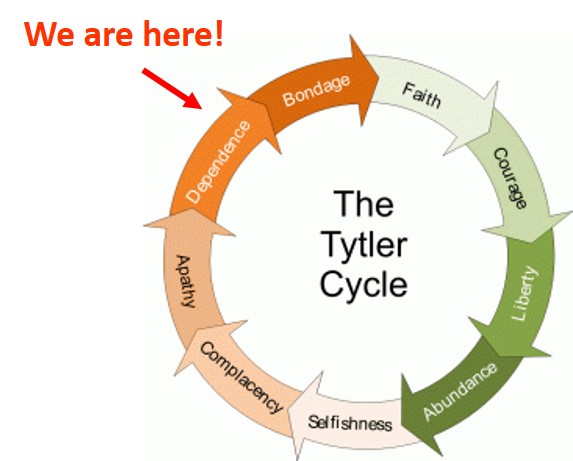We’ve talked about how human beings rank fairly low in the animal kingdom in regards to physical strength and durability, and we’ve looked at how man’s superior intelligence evens the score by giving him an edge in the survival game. But there’s a third factor to consider.
There is an almost undefinable essence that truly sets man apart from the other animals.
Scientists attribute this uniqueness to our DNA. Philosophers call it our soul or spirit. Others identity it as our conscience, while many more call it personality, individuality, persona, or nature. Whatever label you choose, it comes with an overabundance of quirky eccentricities not found in the other species cohabiting this world.
Personality
Yes, I agree that humans and animals have personalities, but only man can claim the vast complexity of traits that set us apart from them. A recent study from the Massachusetts Institute of Technology (MIT) identified 638 primary Personality Traits. After dividing them into three categories, they classified 37% as positive (ex: amiable, courageous, optimistic, and reliable); 18% neutral (ex: ambitious, determined, self-conscious); and a staggering 48% negative (ex: abrasive, apathetic, discontented, imprudent). (Ref: http://ideonomy.mit.edu/essays/traits.html)
While the list is fairly comprehensive, it is nowhere near complete, especially when you consider the infinite number of possible combinations. And that’s before you take other factors into consideration. Factors like …
Emotions
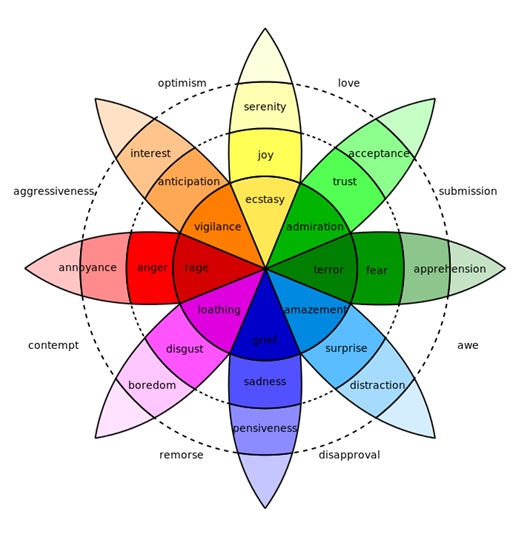 Robert Plutchik, professor emeritus at the Albert Einstein College of Medicine with a Ph.D. from Columbia University, set out to classify emotions into primary categories. Working with the Dalai Lama and using scientific approaches to analyze facial muscles used in heightened levels of emotion, he determined there are eight primary states: anger, fear, sadness, disgust, surprise, anticipation, trust, and joy.
Robert Plutchik, professor emeritus at the Albert Einstein College of Medicine with a Ph.D. from Columbia University, set out to classify emotions into primary categories. Working with the Dalai Lama and using scientific approaches to analyze facial muscles used in heightened levels of emotion, he determined there are eight primary states: anger, fear, sadness, disgust, surprise, anticipation, trust, and joy.
Of course, there many, many more feelings than these eight, but based on similar muscle usages, Plutchik concluded that all emotions fall into sub-categories under the primary.
Fact or hypothesis? It’s your decision. But the question arises – Do animals have emotions? Let’s consider two definitions pertinent to this discussion:
Sentience is the capacity to feel, perceive, or experience subjectively. It encompasses a wide spectrum of both positive and negative physical and emotional experiences. Most scientists today are in agreement that all vertebrate animals, which includes mammals, our winged friends, cold-blooded reptiles, and the creatures of the sea, are sentient beings.
Sapience, on the other hand, is defined as good sense, intelligence, wisdom, or the ability of an entity to act using a mental faculty to apply appropriate judgment (Homo sapiens – Latin: “wise man”). Sound judgment requires the ability to assess conditions in a complex and dynamic environment, apply a moral code, analyze risk factors, calculate outcomes, and derive a best case conclusion. I believe we can all agree this ability belongs to man alone.
So, to answer the above question, yes, I believe all animals experience emotion. Consider the threat of danger that triggers fear … which in turn triggers survival behavior (the fight or flight response). This is inherent to all animals, man included.
On the other hand, I believe sapience is God’s gift to man alone.
Spiritual Needs
For the duration of a pregnancy, the mother’s body provides everything a baby needs: nutrition, oxygen, temperature control, and waste management. At birth, when the baby is separated from the mother’s body, the newborn must learn quickly how to regulate all of these things for himself, while experiencing a nightmare of new sensations – light, sound, taste, temperature fluctuation, movement restriction, and hunger. It’s a scary place.
Each newborn babe, whether animal or man, comes into this world with an innate craving, a need for connection, acceptance, comfort, and safety.
Those needs don’t change as time passes. Wolves roam in packs. Red Snapper swim in schools. Geese fly in close formation as they relocate with the seasons. Man searches for a place to belong within families, communities, social groups, schools, workplaces, organizations – and yet he often moves on. Changes jobs. Makes new friends. Searching. Always searching. Always wondering. Always asking questions. Why am I here? What is my purpose? Is this all there is?
Christians often claim there is a “God-sized hole within our hearts that only the one, true God can fill,” which leads us to yet another question; Is this a biblical concept, or just fanciful rhetoric?
My answer is no. And yes.
Back in the 1600s, Blaise Pascal, inventor, mathematician, physicist, theological writer, and apologist, said in defense of Christianity:
“What else does this craving and this helplessness proclaim but that there was once in man a true happiness, of which all that now remains is the empty print and trace? This he tries in vain to fill with everything around him, seeking in things that are not there the help he cannot find in those that are, though none can help since this infinite abyss can be filled only with an infinite and immutable object. In other words, by God himself.”
But we can also attribute a story from the Bible where the Apostle Paul was witnessing to the Greeks. Now the Greeks were notorious for all their idols, even a monument to an “unknown god” – kind of like hedging their bet, I guess. In case they missed one.
In Acts 17:22-27, Paul says:
“Then Paul stood before the meeting of the Areopagus and said, “People of Athens, I can see you are very religious in all things. 23 As I was going through your city, I saw the objects you worship. I found an altar that had these words written on it: TO A GOD WHO IS NOT KNOWN. You worship a god that you don’t know, and this is the God I am telling you about!
The God who made the whole world and everything in it is the Lord of the land and the sky. He does not live in temples built by human hands. 25 This God is the One who gives life, breath, and everything else to people. He does not need any help from them; he has everything he needs. 26 God began by making one person, and from him came all the different people who live everywhere in the world. God decided exactly when and where they must live. 27 God wanted them to look for him and perhaps search all around for him and find him, though he is not far from any of us.
All animals follow the primal, never-changing eat-sleep-procreate dictate set out for their lifespans, but only man seeks for more. Call it ego, the soul, a conscience, spirit, chi, or life-force, only man seeks acceptance and a reason for his being.
For Christians, the truth lies in that ‘God-sized hole’ in our hearts, the one that Jesus readily fills with love and a peace that passes all understanding.





